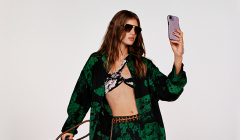
H&M embraces escapism with White Lotus tie up
Launching at the start of London Fashion Week and as the drama’s latest season unfolds, the collection marks iconic cultural moments.

For a generation that has grown up largely in crisis, fun and humour is important

When Mark Ritson said, "people forget that humour is an emotion", he could easily have been referring to the overwhelming number of Christmas adverts, predominantly heart-warmers and tearjerkers, which seem to feature on prime-time TV at this time of year.
Christmas is a critical opportunity for brands to engage with their audiences, and it's widely acknowledged that using emotional and sentimental triggers are a sure-fire way of opening people's hearts and purse strings. It is no secret that every year, consumers and marketers alike, wait for John Lewis and Marks & Spencer's highly anticipated festive campaigns to give their take on the latest iteration of the Christmas spirit.
However, in recent years, there's been a noticeable shift in this tried and tested Christmas formula as humour begins to take centre stage as a purchase-driving narrative. Indeed, one of the most successful Christmas campaigns in recent years was Aldi's in 2021, widely described by industry press as "genius", "hilarious" and dubbed the year's "most effective Christmas campaign".
Playing just as hard as they work, they're [Gen Z] embracing party culture and entering this newfound era in full force.
Brooke Fenton, Strategist at Cult
Aldi's re-imagination of Charles Dickens 'A Christmas Carol', was paired with the recent legal feud and (twitter battle) over the rights of Colin the Caterpillar - the notorious chocolate-flavoured caterpillar cake. The animated short, following Kevin the Carrot with Colin's unmissable cameo, was universally applauded. Kantar reports that it scored in the top 6% of all UK ads for its, "distinctiveness and enjoyability, as well as on humour and brand cues." Aldi's joyous Christmas entry not only shows how a humorous Christmas ad can make for truly memorable material but also has monetary benefits, as it was the only major supermarket to grow sales that December.
A global survey found that nine out of ten (91%) of people prefer brands that are funny. For digital natives, Gen Z, ads and content that are humorous and fun are shown to rank above other sentiments. Perhaps not so surprising given this generation has been more exposed to negative 'news' than previous generations due to the accessibility afforded by the internet and social media.
From a young age, Gen Zer's have witnessed and lived through pivotal and life-changing events, not least the pandemic, which saw their education disrupted and this generation starved of much needed social interaction. This in addition to the many other ills plaguing the world today, not least wars, economic unrest, the rising cost of living and the effects of climate change - all consumable with a decent WIFI connection.
Playing just as hard as they work, they're embracing party culture and entering this newfound era in full force. The new roaring 20s (2020) are well underway as the party aesthetic allows GenZ to let loose and recoup some of the time lost from multiple lockdowns.
The hashtag, #Nightout, has 3.6M views on Tiktok, with 87% of Gen Zer's agreeing or strongly agreeing that they are currently looking for content that provides them with a sense of escapism. The take-out for brands is clear; it’s beneficial to provide Gen Zer's with content that meets this need and resonates. Jack Wills #TizTheSZN's campaign is shot from a first person POV, personally inviting Gen Zer's to their party, providing them with the joy they crave as they seek more happy and positive moments.
The play hard mantra doesn't just apply to all-nighters but also trickles through into beauty and fashion, as Gen Z creators go all out and normalise excessive expression. Just think of HBO produced, Euphoria, and its representation and influence on this generation. Euphoria's bold portrayal of teenagers' lives, relationships and fashion sense resonates with Gen Zer's who account for 40% of the first season’s viewership. The HBO show inspired a generation to enact freer and bolder forms of self-expression as they use fashion and beauty to reinvent themselves, meeting this generation’s need for fun and escapism.
To get the attention of fast-paced Gen Zer's, brands need to be present in their native environments tapping into their satiric humour and providing them with the high-energy entertainment they crave. This year we've seen more brands adapt their Christmas adverts to include humour and/or joy. Much like Aldi's Home Alone parade (featuring none other than Kevin the Carrot), Sainsbury's 'Pudding It Out There' starring the comical TV personality Alison Hammond or Jack Wills #TizTheSZN party led by a host of influencers. What Gen Z are looking for is humorous outtakes and envy-worthy locations this Christmas.
Brooke Fenton is a strategist at Cult working with beauty and fashion clients. Prior to joining Cult, Brooke worked for Mediacom, working her way up from Media Apprentice to Operations Specialist in the display team over three years.
Looks like you need to create a Creativebrief account to perform this action.
Create account Sign inLooks like you need to create a Creativebrief account to perform this action.
Create account Sign in